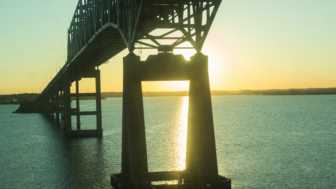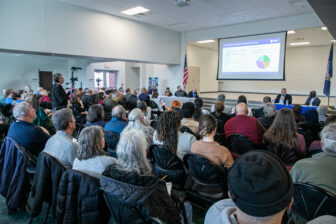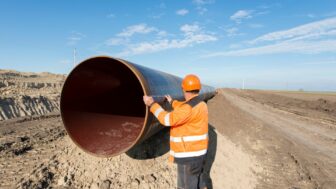Opposition Against TransCanada’s Potomac Pipeline for Fracked Gas is Swelling Across Region
HANCOCK, MD- Over 200 concerned citizens from Maryland, D.C. and West Virginia joined in opposition to the Potomac Pipeline on Tuesday evening in Hancock, Maryland during the Maryland Department of Environment’s public hearing on the controversial pipeline. The evening included a rally outside Hancock High, where the hearing was held, and silent protests during the hearing, with activists standing holding signs while pipeline proponents spoke.
The pipeline, proposed by TransCanada, would ship fracked gas from Maryland to a Mountaineer Gas pipeline in West Virginia, passing through the town of Hancock and underneath the Potomac River. The group of activists drew attention to the dangers of the proposed pipeline and called on Maryland Governor Hogan to direct his administration to protect clean water and deny the water permit necessary for its construction.
“The state of Maryland rose up in unity to stop fracking this spring,” Brooke Harper, Environmental Justice Chair of the NAACP Maryland State Conference and Maryland Policy Director of the Chesapeake Climate Action Network, stated. “But now TransCanada wants to threaten our communities with fracked-gas infrastructure. Governor Hogan cannot allow this to happen. We will rise up again and again until this pipeline has been stopped.”
The rally and public hearing took place amid swelling opposition to the pipeline from across the region. In recent weeks, the Boonsboro Town Council and the D.C. Council sent letters asking Governor Hogan to reject the pipeline, while the Washington County Board of Commissioners sent a letter expressing concerns about the pipeline and asking him to “protect drinking water” and postpone approval for the pipeline until its dangers are addressed.
“The major concern is the Potomac River,” said Dan Divito, Washington County Deputy Director of Water Quality, addressing his concerns to the Herald-Mail. “The Potomac River is the source of water for our Sharpsburg water treatment plant that supplies all the water to all the citizens of Sharpsburg. The Potomac River is also the source of water for the city of Hagerstown, which not only provides water to the citizens of Hagerstown within the city limits, but also Funkstown Smithsburg, and Williamsport. So there’s a significant number of people who rely on the water that comes from the Potomac River.”
The rally also included landowners like Patricia Kesecker, a seventh generation farmer in West Virginia who was sued by Mountaineer Gas for the right to seize portions of her property to build the pipeline. Kesecker is going to court on Friday, December 22 to request a jury trial to repeal the decision. “It’s a sad day for our family when we have to go to court because Mountaineer Gas wants to seize the land that has been in our family for generations,” Patricia Kesecker stated. “It’s even sadder because it is happening right before Christmas. They won’t allow us our peace on Earth, not even at the holidays.”
The pipeline is being proposed by TransCanada, infamous for backing the Keystone XL pipeline. Less than a month before the hearing, TransCanada’s Keystone pipeline spilled 210,000 barrels of oil in South Dakota. TransCanada’s track record also includes gas pipeline explosions in Manitoba and Wyoming.
“We are well too aware of the risks at stake from this pipeline,” Sammi Brown, Director for Progressive Change Campaign Committee at the West Virginia Working Families Party. “We have seen spill after spill from TransCanada and other companies. We know what will happen if we let them build this — and we won’t let it happen. I will work tirelessly to protect my community in West Virginia. ”
“The risks posed by this pipeline are far greater than the MDE has yet taken into consideration,” stated Brent Walls, Upper Potomac Riverkeeper. “It’s about more than the TransCanada portion of the pipeline. There is a significant threat from the Mountaineer Gas pipeline, which will cross numerous streams that feed into the Potomac River and drinking water sources for the public. But without this information, MDE should have no choice but to deny his permit and the 401 certification.”
From paddling against the pipeline, to a months-long encampment in the spirit of Standing Rock, the coalition fighting the Potomac Pipeline has built a massive movement and drawn national attention to the harms that this project could cause.
Paula Jean Swearengin, West Virginia resident and previous board member of the Keepers of the Mountain Foundation, stated: “As a West Virginia resident and social justice organizer, I’ve seen firsthand how pipelines like this cause downward spirals in our communities. Often times the jobs are outsourced, and the people’s land, water, communities and local economy suffer greatly. West Virginia’s valuable drinking water supply has already taken a hit from fossil fuels, whether it be coal, fracking or pipelines. West Virginia doesn’t need another hit and we hate to see Maryland go down the same path.”
Organizations participating in the action include the Chesapeake Climate Action Network, Eastern Panhandle Protectors, Sierra Club, Potomac Riverkeeper Network, Waterkeepers Chesapeake, and Food and Water Watch and DC 350.
CONTACT:
Brooke Harper; Chesapeake Climate Action Network; brooke@chesapeakeclimate.org; 301-992-6875;
Brent Walls; Upper Potomac Riverkeeper; Brent@upperpotomacriverkeeper.org; 443-480-8970;
Denise Robbins; Chesapeake Climate Action Network; denise@chesapeakeclimate.org; 608-620-8819
###






